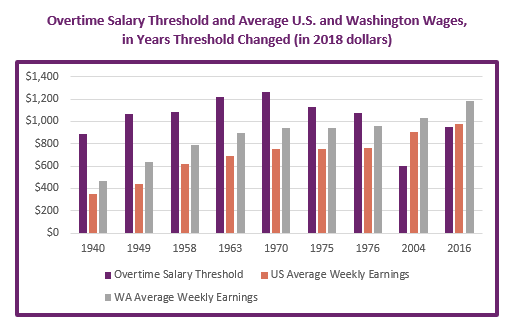President Trump’s Department of Labor (DOL) has announced a proposed new overtime salary threshold of $679 per week, or $35,308 a year. The proposed new rule will leave millions of American workers toiling long hours below a living wage.
Overtime rules require employers to pay salaried workers who make less than the threshold additional wages when they work more than 40 hours in a week. Through the 1970s, policymakers regularly updated the threshold so that the majority of salaried employees, along with all hourly wage workers, were eligible for overtime pay of 1.5 times their usual rate for work beyond 40 hours.
That extra pay both boosts family incomes and gives employers a disincentive for requiring employees to put in long hours. As a result, people have more time for family, rest, and community life. Workers with salaries above the threshold and a defined set of managerial and professional duties are presumed to have enough bargaining power and flexibility not to need the protection of basic labor standards.
Over the past four decades, federal and state policymakers have allowed the salary threshold to lose value to inflation and rising wages. It is now a laughable $455 per week, or $23,660 annually – below the $480 someone working full-time at Washington’s minimum wage makes. Restaurant and retail supervisors, social workers, nonprofit employees, and administrative assistants are among the many people now earning low salaries that leave them struggling to support themselves and their families, while being expected to work 50, 60 or more hours every week.
During Obama’s presidency, the DOL undertook a lengthy study and rule-making process that resulted in a new threshold of $913 per week, or $47,476 annually. But business groups sued, and a Texas court ruled the new threshold invalid. With Trump appointees running the show, the DOL did not challenge the ruling, so the old level stands.
Even the Obama era threshold would not have assured a small family a living wage in Washington State. According to the MIT Living Wage calculator, an adult with one child in relatively affordable Yakima needs an annual income of over $50,000 to meet basic expenses, while a family of four needs $66,000. In King County, a single parent would need to make at least $64,000 and a family of four requires $80,000.

Policymakers adjusted the salary threshold seven times from 1940 through 1976. Each time, they set the threshold well above average earnings both across the U.S. and in Washington State. When the Bush administration revisited the level in 2004, it set a level well below the historical norm. The Obama-era level of $913 a week came close to meeting the U.S. average wage then, but was $200 less than Washington’s average weekly wage that year.

Sources: U.S. Department of Labor, Social Security Administration (U.S. avg. wages), Washington Department of Economic Security (Washington avg. wages), and U.S. Bureau of Labor Statistics Inflation Calculator
Washington State has regularly set stronger workplace standards than the federal government on other issues. Our minimum wage of $12 per hour is well above the federal wage of $7.25, and we were the first state to index minimum wage to inflation. We have statewide paid sick and safe leave guarantees and are implementing a comprehensive paid family and medical leave program, while the federal government still sets no standards for paid leave.
Washington also needs to update its own overtime salary threshold to a meaningful level that will protect the majority of working people and families in our state. Fortunately, our Department of Labor and Industries is preparing to do just that, and is expected to announce its own proposed new rule sometime this spring.
Meanwhile, the DOL’s proposed threshold is too low to protect America’s working families.
More To Read
January 17, 2025
A look into the Department of Revenue’s Wealth Tax Study
A wealth tax can be reasonably and effectively implemented in Washington state
January 6, 2025
Initiative Measure 1 offers proven policies to fix Burien’s flawed minimum wage law
The city's current minimum wage ordinance gives with one hand while taking back with the other — but Initiative Measure 1 would fix that
September 24, 2024
Oregon and Washington: Different Tax Codes and Very Different Ballot Fights about Taxes this November
Structural differences in Oregon and Washington’s tax codes create the backdrop for very different conversations about taxes and fairness this fall
